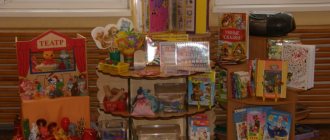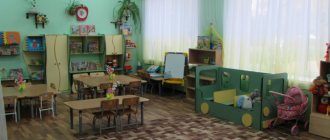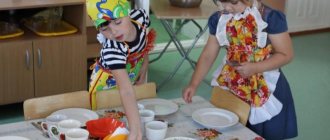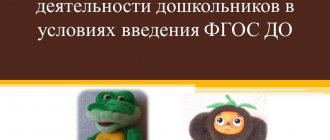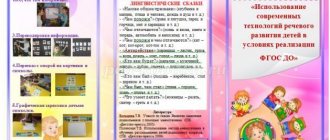Good speech is the most important condition for the comprehensive development of children. The richer and more correct a child’s speech, the easier it is for him to express his thoughts, the wider his ability to understand the surrounding reality. A child is not born with developed speech; it is impossible to say unambiguously when and how the baby masters the ability to speak, pronounce sounds correctly and clearly, connect words with each other, construct sentences of varying complexity, and express his thoughts coherently and consistently. The formation of a holistic picture of the world and broadening of horizons is greatly influenced by the organization of a subject-spatial developmental environment, that is, it is necessary to create conditions for independent speech activity of preschoolers. To solve this issue, a developmental subject-spatial environment was created in all groups, which included material objects of the child’s activity and the ability to functionally model the content of his comprehensive development. The developing subject-spatial environment is organized in accordance with the requirements of the approximate basic educational program of preschool education, edited by N.E. Veraksy, M.A. Vasilyeva, T.S. Komarova “From birth to school”, developed on the basis of Federal State Educational Standards. According to the Federal State Educational Standard for Educational Education, the developing subject-spatial environment must be content-rich, multifunctional, transformable, accessible, variable, and safe. When creating a speech development environment, the following are taken into account: - the characteristics of children of a particular age group - the level of speech development of each child - the interests and abilities of children “A child will not speak in empty walls” Elena Ivanovna Tikheyeva. By saturating the group space, our teachers primarily ensure that children in the group can satisfy their important life needs in movement, cognition, and communication with adults and peers. Kindergarten groups are equipped with gaming and teaching equipment, which includes visual and handout material. In order to create conditions for stimulating speech activity and verbal communication, speech development centers have been established in our kindergarten in all age groups. Teachers have accumulated and systematized a variety of practical material for organizing speech games and activities. They include manuals for articulation exercises, materials for storytelling, a variety of didactic, board and printed games, games for the development of fine motor skills, sets of finger games, toys for the development of correct speech exhalation, thematic albums, games for enriching vocabulary, formation grammatical structure, coherent speech, development of phonemic hearing and fine motor skills and much more. In free play activities, children independently practice in the center: do tongue exercises, play games to develop air flow, take outlines, lacing, mosaics, and puzzles. One of the forms of work on speech development is a lapbook. A laptop is an interactive folder that allows you to replenish children's vocabulary, speed up and make more attractive the process of automation and differentiation of sounds, form grammatical categories, develop coherent speech, and improve fine motor skills. At any convenient time, the child opens the laptop and happily repeats what he has learned. An interesting material for children in the speech corner is the game guide “Speech Cube”. The manual consists of cubes of different sizes made of cardboard. On each side of the cube there are transparent pockets designed for replaceable speech material. This material is used when performing articulation exercises to develop children's gross and fine motor skills, lexical and grammatical structure and coherent speech. It is changed by the teacher as the children master various topics. Children play with cubes independently in their free time, reinforcing the material worked out in class. While playing, preschoolers toss the cube and complete the task that lands on the side of the cube. The content and updating of material in the corner occurs periodically and depends on the topic of the week, month, lexical topic, traditions and holidays, which corresponds to the principle of transformability and variability of the subject-spatial environment. According to the principle of multifunctionality, other components of the group’s subject environment are used in the corner, such as: a screen for showing puppet shows, soft portable modules, a magnetic board. All materials in the corner are freely available to children and provide all the main types of children's activity: gaming, cognitive, creative, motor, communicative), which corresponds to the principle of accessibility. The principle of safety is implemented in the reliable strengthening of all equipment in the corner and the safety of the materials from which the games and aids are made, as well as the safety of their use. Properly selected books have a great influence on the development of speech. Children look at illustrations of familiar and unfamiliar works of art. Turning to familiar works strengthens children's memory, telling stories using pictures and illustrations, and develops and enriches speech. Here are your favorite children's fairy tales and stories on lexical topics, as well as illustrative material and photographs of children's writers. Together with the children, we systematically organize exhibitions of the works of this or that author (for example, for anniversaries), conduct literary quizzes and reading competitions. Along with fiction, the book corner presents reference and educational literature. Each child can independently choose a book, pictures, illustrations as they wish. To develop speech creativity in all age groups, corners of theatrical games have been organized, where various types of theater are located. Here the child can independently or with the participation of an adult take on the role of a fairy-tale character. We also use a theater on a flannelgraph, a theater on a magnet, which is designed specifically for children not only to listen to a fairy tale, but also to see its characters. Together with the music director, we stage puppet theater shows with children and show them to younger children. We also stage theatrical productions of fairy tales for children’s matinees and events with parents. Role-playing games (“Hospital”, “Family”, “Shop”, “Hairdresser”, “Young Master”, etc.) are of great importance for the development of a preschooler’s speech, which contribute to the development of children’s role-playing speech and the ability to conduct a dialogue with peers and adults, so in each group all the necessary conditions have been created for such games. In order to develop the creative potential of teachers, our preschool educational institution holds review competitions for the best design of the subject-spatial environment. We visit the children's library with the children of the senior and preparatory groups. After such excursions, children begin to visit with pleasure with their parents and become young readers. The help of parents plays an important role in organizing the subject-spatial environment. They made various types of theaters: knitted, spoon theater, finger theater, caps and masks for theatrical performance, material for the development of fine motor skills (massage balls, clothespins). The inclusion of parents in the pedagogical process is also the most important condition for the full speech development of the child. Working on the problem of children's speech development for parents: • Information stands are set up in preschool groups. • Consultations and individual conversations are conducted with a speech therapist teacher on the topics: “How to develop coherent speech”, “Learning poetry”, “Child and book”, “The role of the family in raising children’s speech”, “Developing speech by playing”, etc. . • A master class was held on the joint production of games and aids for the formation of the grammatical structure of speech, “Didactic games and aids that develop phonemic perception.” • Master classes “Use of mnemonics in the development of children’s speech”, “Playing with fingers - developing speech”. In order to develop the creative potential of teachers, our preschool educational institution holds review competitions for the best design of the subject-spatial environment. The child’s verbal interaction with objects of the developmental environment and with peers contributes to the development of his experience of verbal communication, the development of independence, initiative in establishing verbal contact, and the free choice of the subject of communication. The number of speech contacts between peers, which arise spontaneously, on the initiative of the children themselves, is increasing. As the practice of working in kindergarten shows, a properly organized developmental environment allows a child to learn to interact with peers and adults, to understand and evaluate the feelings and actions of people, and this is precisely what underlies developmental communication.
Subject-based development environment as a factor in the development of a child’s speech activity
Municipal preschool educational institution
"Kindergarten No. 86 combined type"
Consultation for educators:
“Subject developmental environment as a factor in the development of a child’s speech activity”
/pedagogical council No. 2/
Prepared by: teacher
1 sq. categories
Martynova N. N.
Saransk 2021
Good speech is the most important condition for the comprehensive development of children.
The richer and more correct a child’s speech, the easier it is for him to express his thoughts, the wider his opportunities for understanding the surrounding reality, the more meaningful and fulfilling his relationships with peers and adults, the more active his mental development is. Any speech disorder to one degree or another can affect the child’s activities and behavior. Children who speak poorly, beginning to realize their shortcomings, become silent, shy, and indecisive.
Communication with peers is central to increasing speech activity. Joint games and other various activities encourage the development of vocabulary, contribute to the mastery of non-situational forms of communication, and the ability to enter into dialogue.
One of the important conditions in the speech development of a preschooler is the subject-specific developmental environment.
The environment is considered as an opportunity for the greatest development of the child’s individuality, taking into account his inclinations, interests, and level of activity.
“A child will not speak in empty walls” - E. I. Tikheeva. When saturating a group space, teachers should think first of all about how children in the group can satisfy their important life needs in movement, cognition, and communication with adults and peers. Groups should be equipped with modern gaming and didactic equipment, which includes visual handouts that ensure a higher level of cognitive and speech development of children .
A subject-based developmental environment is a system of material objects of a child’s activity that functionally models the content of his spiritual and physical development. An enriched environment is the unity of social and objective means of ensuring a child’s varied activities. The environment is considered as an opportunity for the greatest development of the child’s individuality, taking into account his inclinations, interests, and level of activity. When organizing the subject environment, you must adhere to the following principles.
Principles for building a developmental environment in a group.
1. The principle of “distance, position in interaction”
, which focuses on organizing a space for an adult to communicate
“eye to eye”
, facilitating the establishment of optimal contact with children, which is realized through a
“solitude”
.
